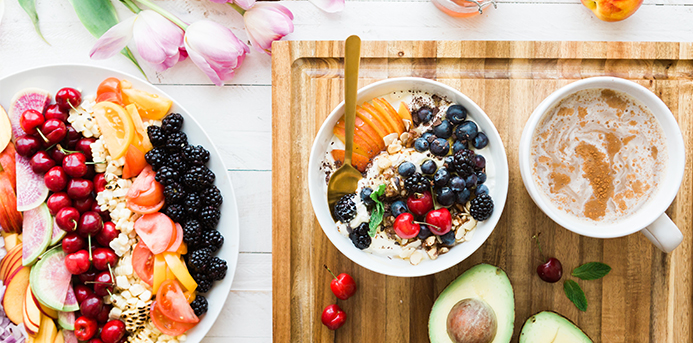Forget four-letter words when it comes to getting healthy and shaping up for summer (namely, D-I-E-T).
To really reshape your attitude toward food, health, and wellness, it’s all about making small changes to create a healthier lifestyle that will make you feel good and look good. Even better, the results will last for more than two weeks.
“No one wants to diet all the time,” says Shanti Pappas, functional medicine health coach at Happy Belly Health in San Francisco. “The busy professionals don’t need a second job of managing their weight all the time.”
We asked five health coaches to share their best advice for changing your relationship with food and dieting for good.
1. Find comfort in things other than food
“Stress and emotional turmoil often cause poor eating habits,” says Claire Ridge, owner of Ridges Stitches and a certified health coach and yoga instructor. “People are usually dealing with trouble in relationships, career, finances, exercise habits, and other lifestyle aspects that impact the body. This causes them to indulge in foods that make them feel worse after consumption.” Cue the never-ending cycle of stress followed by emotional eating.
Emotional eating is triggered by parts of the brain that are rewarded when people consume high-fat or high-sugar foods. As with any rewarding behavior, people are then likely to repeat it. So, how does one fight the urge?
First thing’s first, drink water when you have a craving for something unhealthy. “This gives people the chance to pause and really consider if they are eating out of boredom, sadness, etc. or if they are actually hungry,” Ridge says.
Additionally, “Sometimes cravings are a good indicator of other things they need in life that don’t even revolve around food,” Ridge says. For example, she says, people might crave mac and cheese, a comfort food, but they could replace it with time spent doing activities they enjoy, such as spending time with family, reading a book, or taking a bath.
2. Eat whole foods that are closest to the source

“When it comes to what you’re putting in your body, whole foods are going to nourish the body the best,” Ridge says. Take an apple for example. “An apple is just an apple. It is not processed with other ingredients and will have the most nutrients, as it is the closest thing to the source.”
There are many reasons to eat whole foods. A study by the JAMA Network revealed that adults who cut back on processed foods and added sugars lost weight over the course of a year without cutting calories. Further incentive to stay close to the source: According to a 2018 study by The BMJ, highly processed foods may be linked to certain cancers.
“The further you get away from the source, such as applesauce, apple juice, then Apple Jacks, the less benefits it will have for the body,” Ridge says. “This doesn’t mean that applesauce is bad. It just means that apples are going to be better.”
3. Keep a food journal — and stop skipping breakfast

To really begin to change your relationship with food, you need to know what exactly it is you need to change. Keeping a food journal to jot down what you eat and drink in a day, plus how much sleep and exercise you get, will help you identify patterns and find exactly where you can make adjustments.
“For example, if you notice you eat very little all day and binge at night, structure an eating schedule to help you move away from restrictive eating and diet mentality,” Pappas says.
Plan out meals that will fill you up earlier in the day to avoid binging late at night. And stop skipping breakfast! According to Rush University Medical Center, various studies have found that while people who eat breakfast may consume slightly more calories during the day, they’re less likely to be overweight and consume unhealthy snacks throughout the day. Pappas recommends pairing protein-rich eggs with avocado for healthy fat and complex carbs likes vegetables and/or berries. “Breakfast should be nutrient dense and filling enough to take you to lunch.”
4. Practice mindful eating
Whether you have an hour or 15 minutes, set aside time for meals — away from the computer, phone, or TV — and actually pay attention to what you’re eating.
“I find that many of my clients struggling with overeating eat meals while at their desk in front of electronics,” says Brittany Forman, FNLP, CHHC, Functional Nutritionist and Health Coach. “This environment involves a high level of stress and distracts people from the enjoyment and nourishment of eating, often causing people to shovel food into the mouth and barely chew.”
In fact, a study from the University of Illinois found that distracted dining can be as dangerous to your health as distracted driving is to your safety on the highway. (This is true for your kids, too! Another reason why uninterrupted family dinners are so important.)
5. Stop counting calories

“Not all calories are created equal,” says Linda Citron, Certified Nutrition and Health Coach and owner of Citron Nutrition. “And counting calories is not a healthy relationship with your food.”
According to Harvard School of Public Health, paying attention to calorie quality is more important that cutting back on calorie quantity, despite what many diets advertise. High-quality calories are found in minimally processed foods, like fruits and vegetables, while low-quality calories are found in refined sugars and grains.
For example, Citron says, 100 calories of cookies or pretzels is not the same as 100 calories of avocado or almonds. “I’d rather you have 200 calories from an apple and almonds than a 100-calorie snack pack. The apple and almonds will provide nutrients for your health and the fiber and fat will keep you feeling fuller longer than a 100-calorie snack pack.”
6. Ditch dieting for good
Starting a diet is an easy way to set yourself up for failure, causing the feeling of “falling off the wagon” if you splurge on something. Constant dieting can even be bad for your mental health, so resist the temptation to start yet another fad diet.
“Cyclical dieting can be very black and white,” says Amanda Skrip, natural foods educator, chef, health coach, and wellness expert. “There’s often a lot of labeling your eating patterns as ‘good and bad’. Making a commitment to creating lasting lifestyle changes — rather than just looking for a quick fix — is the way to permanently stop incessant dieting.”
And, don’t fret if you indulge in dessert or a few cocktails once in awhile — it does not mean you are back at square one. “I think if people can get to a place where they’re eating well 75-80 percent if the time, there’s room in a healthy diet to eat for enjoyment the remaining time. This helps make it easier to stick to a lifestyle change, rather than always feeling deprived.”
Feature photo by Brooke Lark on Unsplash.
More from Make It Better:
- 13 Easy Ways to Practice Self-Love Every Day
- 16 Scary Things That Happen to Your Body When You Don’t Get Enough Sleep
- 7 Trainer-Approved Workout Tips That Get Your Heart Pumping and Blast Calories
 Lindsay Roseman, formerly Make It Better Digital Editor, is a Chicago-based writer, editor, and lifestyle blogger living in Old Town. When she’s not blogging about her current favorites on What Lindsay Loves, she’s looking for the best new thing in fashion, beauty, food and entertainment — or she’s probably running. Other things Lindsay loves: banana lattes and small dogs (she’s a dog mom to @LylaTheCockapoo). Her work has also been published in CS, NS, and Women’s Health magazines. She is a proud supporter of Court Appointed Special Advocates.
Lindsay Roseman, formerly Make It Better Digital Editor, is a Chicago-based writer, editor, and lifestyle blogger living in Old Town. When she’s not blogging about her current favorites on What Lindsay Loves, she’s looking for the best new thing in fashion, beauty, food and entertainment — or she’s probably running. Other things Lindsay loves: banana lattes and small dogs (she’s a dog mom to @LylaTheCockapoo). Her work has also been published in CS, NS, and Women’s Health magazines. She is a proud supporter of Court Appointed Special Advocates.

